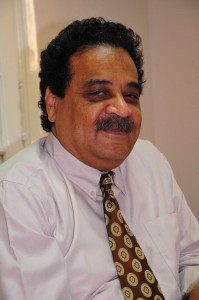
The democratic entities are currently being bombarded with many questions concerning Al-Sisi’s nomination. The questions’ purposes are not answers, but rather denunciation. They are asking: “Will you dare object to Al-Sisi’s nomination?” The weird irony is that Al-Sisi hasn’t even announced his nomination yet. In addition, the available statements for him do not confirm that he will run for presidency. Instead, some of these statements deny the possibility. The question is also usually asked by certain groups in the political scene such as supporters of the old regime, particularly the police state. Their question is usually followed by another one: “Do you have a candidate like Al-Sisi?” They then proceed to answer the question: “If you have a candidate like him, then let him run or just leave the whole political scene since you are not aware of what is happening on the ground. We are fed up of your existence and your speech about democracy.”
All of those who support the old regime, with all of their categories and classes, are pushing for Al-Sisi to run and they treat him as their own candidate. Not only that, but they also consider him the anti-democracy candidate. They also present him as the candidate against the 25 January Revolution or in other words the candidate for 30 June, which they consider the revolution that will revive the pre-25 January regime.
On the other hand, the democratic entities are confused. Some of them see Al-Sisi as a worthy candidate to support due to his stance on 30 June. In addition, the fight against the Brotherhood requires uniting all efforts under the leadership of the institution that is capable of facing the Muslim Brotherhood and eliminating them. They see it as the alternative to the current government, which is hesitant and weak.
At the same time, some question Al-Sisi’s ability to stabilise security simply by becoming president since he cannot achieve that while being a main player in the current authoritative powers and also the main official responsible for the country’s national security.
Those supporting Al-Sisi see that in the fight against terrorism, some concessions have to be made concerning democracy and human rights. In their opinion, these concessions are necessary and that they are dictated by the intensity of the fight and that they are likely to increase once Al-Sisi becomes president since the fight will probably intensify even more.
Those against Al-Sisi’s nomination argue that the security forces behaviour, which usually subject innocents to a lot of excessive violence and unjustified arrests, will probably lead to reviving terrorism on a wider scale. Unfortunately, this might also lead to the radicalisation of some groups which are considered part of the democratic movement due to the random arrests and torture to which they are subjected.
The question is if Al-Sisi will run for president, what will be the extent of his responsibility considering Egypt’s security keeping in mind that he is currently the deputy prime minister responsible for national security? In addition, how satisfied is he with the current security situation in Egypt? If he is not the only one currently responsible for the security situation, then he is at least one of the few people who are sharing the decision-making and power in Egypt, who are responsible for all political, economic and social happenings in the country.
Regardless of the extent of the role Al-Sisi played since 30 June, it has to be stated that the army, led by Al-Sisi, did side with the people on 30 June. If not for this act, the country would have entered a very dark time, which would have cost the country a lot of losses. Even if Al-Sisi also bares part of the blame for the mistakes that happened, what he has done is the reason people cut him some slack concerning things that happened post 30 June.
What will decide whether the democratic entities will support him is his current position on political issues. Al-Sisi is not a known political persona with a known political direction such as Shafiq, Morsi or Hamdeen. He also does not have a political history from which people can predict his moves and practices, but only a military background that enabled him to reach higher positions in his military career. Therefore, it is imperative that Al-Sisi presents to the people a political programme and agenda in which he could explain to the people his vision for Egypt.
When Mubarak reached power, he had an honourable military record as well concerning the 6 October war. He also stated that he never wanted to rule Egypt and that his greatest hope was to become an ambassador for the country. He said he would become a president for one term only. He repeated many times that “the shroud has no pockets”. During his first days as president, he made sure to meet with the leaders of different political entities, but after a few months, he became a corrupt dictator. Mubarak, in the absence of democracy, became an influential man with unlimited power, surrounded by a hypocritical army. They also justified this by saying that a fight against terrorism means that democracy has to be postponed. This is the same argument currently used to justify the practices of the police state and eventually eliminate democracy.
Lastly, many are asking, if the majority of Egyptians will actually support Al-Sisi, then should the democratic entities even consider objecting to his nomination? Could the hoards of Egyptian be wrong? And even if they are, should democratic entities object to the general mood and subject themselves to social isolation? These are questions that shall be answered in the next column.




